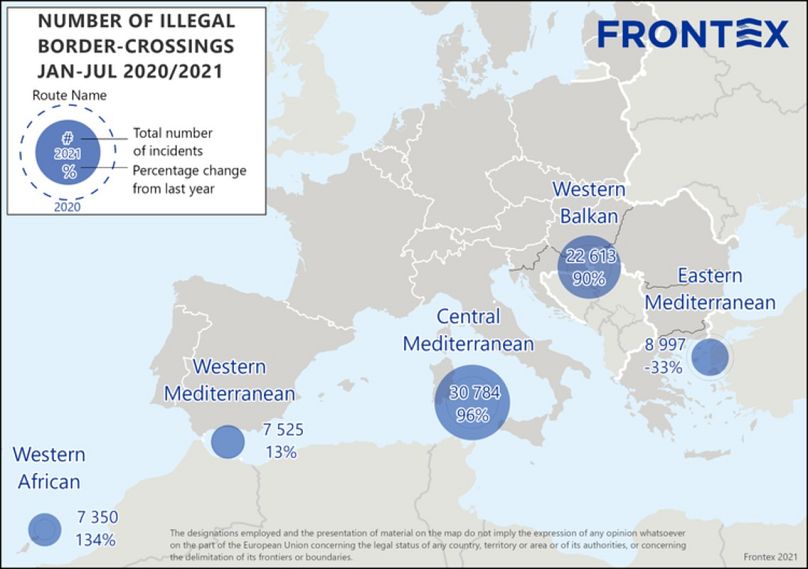A total of 124,000 illegal border crossings were recorded in 2020. So far this year Frontex has observed more than 82,000.
The number of illegal border crossings into Europe rebounded sharply this year after the COVID-19 pandemic brought numbers to their lowest levels in years in 2020.
 ADVERTISEMENT
ADVERTISEMENT
 ADVERTISEMENT
ADVERTISEMENT
The European Union's border agency, Frontex, revealed on Thursday that more than 82,000 illegal border crossings were recorded during the first seven months of the year, a 59% increase from a year ago.
In 2020, illegal border crossings dropped by 13% year-on-year to reach 124,000 because of the COVID-19 pandemic. This was the lowest level recorded since 2013.
Frontex registered 17,300 illegal border crossings last month, a rise of 33% compared to July 2020, and 2,700 more than during June.
The Central Mediterranean route accounts for 37.5% of the illegal border crossings recorded so far this year, a jump of 96% compared to last year, with most migrants using that route coming from Tunisia, Bangladesh and Egypt.
The Western Balkans were the second most used route into the EU, with more than 22,610 migrants — primarily from Syria, Afghanistan and Morocco — choosing it, a year-on-year increase of 90%.
The Eastern Mediterranean, through Greece, was the only route to see a year-on-year decrease, with illegal border crossings dropping by a third to 8,997. Nationals of Syria and Turkey accounted for the largest number of migrants.
The Western Mediterranean and Western African routes were each used by fewer than 8,000 migrants although, for the latter, it represents a 134% increase on the previous year.
Frontex also flagged that illegal border crossings from Belarus into Lithuania have also increased sharply, totalling 3,700 so far this year.
Only 22 and 14 migrants illegally crossed the border in January and February respectively so the very vast majority of these crossings have taken place over the last five months.
Two-thirds of the detected migrants were of Iraqi origin, followed by nationals of the Congo Republic and Cameroon.
"The migration flow is fed by controlled arrivals on tourist visas or on the basis of visa-free entry to Belarus and facilitated movements towards the Lithuania-Belarusian border," Frontex said.
The EU has accused Minsk of encouraging illegal crossings into the EU via its shared border with Lithuania in retaliation with sanctions the bloc imposed after the May forced landing of a Ryanair flight to arrest journalist Roman Protasevich, a prominent opposition figure.
Minsk has rejected the accusations.
Lithuania and Latvia have both declared a state of emergency over the border situation and called for more European assistance.
Frontex has now sent more than 100 officers to help patrol the Lithuania-Belarusian border, as well as patrol cars and helicopters.
Vilnius began building a fence last month to deter third-country migrants from entering the country.











